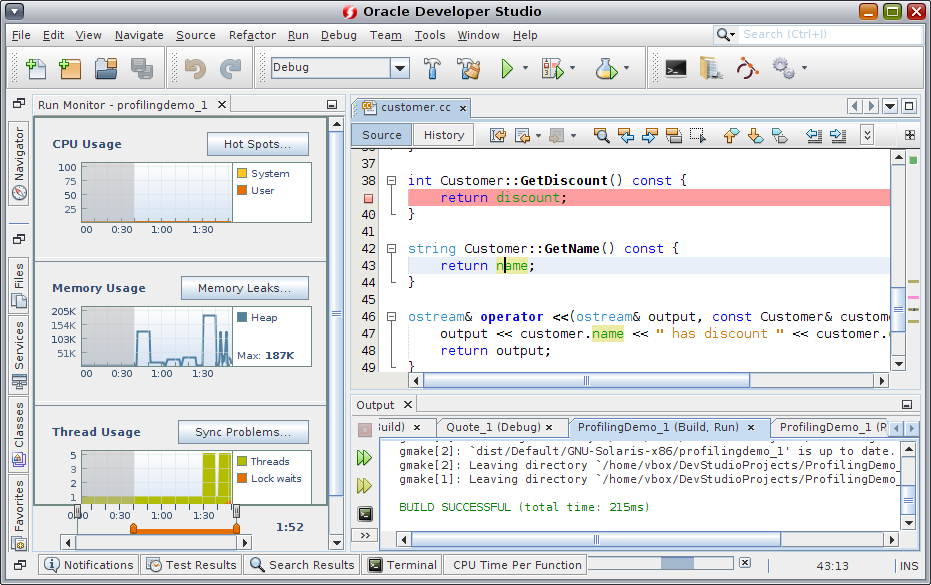Oracle Developer Studio IDE
Oracle Developer Studio IDE is based on NetBeans IDE, an open-source integrated development environment. Oracle Developer Studio IDE includes the core NetBeans IDE, the NetBeans C/C++ plugin module, and additional integrated Oracle Developer Studio components that are not available in the open-source NetBeans IDE.
Oracle Developer Studio IDE uses the Oracle Developer Studio C, C++, and Fortran compilers, the dmake build utility, and the dbx debugger. In addition, the IDE provides graphical profiling tools that use Oracle Developer Studio performance utilities invisibly to collect data on your running project.
Using Oracle Developer Studio IDE offers some advantages over development using text editors and the command line:
-
Code editing. Working with code can be more efficient with syntax highlighting, code completion, navigation between code elements, and integrated API documentation and man pages.
-
Code investigation. When you are trying to become familiar with some code or looking for a root cause of a bug, you might find some useful IDE features such as: Go to Symbol, Find Usages, the Classes window, the Include hierarchy, and the Call Graph.
-
Refactoring. You can find all usages of a variable or operation within a project, rename all occurrences of the variable or operation, and refactor throughout the product. Before performing the refactoring, you can preview the changes in a split-screen UI and approve them individually or all at once.
-
Remote development. You can run the IDE, dbxtool, Code Analyzer, and Performance Analyzer on a desktop system while using Oracle Developer Studio compilers and tools that are installed on a remote server. The tools run on the remote server while displaying back to your IDE or other tool which is running on your local system, with much better response time than typical remote display solutions.
To start the IDE, type the following command:
% devstudio
The following figure shows the IDE with the Quote sample project running with the Monitor Project profiling tools.

A C, C++ or Fortran project is a group of source files that contains information about how to compile and link the source files, and run the resulting program. In the IDE, you always work inside a project even if your program is contained in a single source file. The IDE stores project information in a project folder that includes a makefile and metadata files. Your source directories do not need to be physically located in the project folder.
Each project (except a project created from an existing binary) must have a makefile so that the IDE can build the project. A project's makefile can be generated by the IDE or you can use a makefile that was previously created outside the IDE. You can create projects from existing sources that already includes a makefile, or that build a makefile when you run configure scripts.
You can build, run, and debug projects by clicking toolbar buttons, or by selecting menu commands. By default, the IDE is preconfigured to use the Oracle Developer Studio C, C++, and Fortran compilers, dmake, and dbx. However, if you have GNU compilers on your system, the IDE can usually find them if they are on your PATH. You can use the GNU tool collection by setting the Tool Collection in your project's properties.
You can learn about using Oracle Developer Studio IDE by reading the IDE's integrated help, which you can access through the IDE's Help menu or by pressing the F1 key. Many dialog boxes also have a Help button for information about how to use the dialog box.
The Oracle Developer Studio 12.6: IDE Quick Start Tutorial shows how to get started using the IDE. In addition, the tutorials on the NetBeans IDE C/C++ Learning Trail can also be helpful for learning how to use the Oracle Developer Studio IDE, although there are some differences between the user interfaces and features. In particular, NetBeans documentation about debugging does not apply to Oracle Developer Studio IDE.